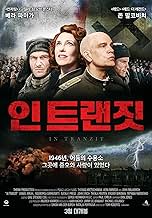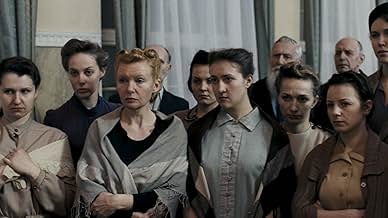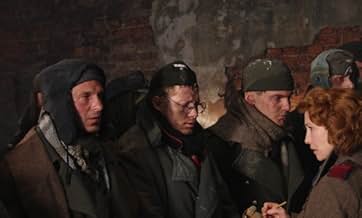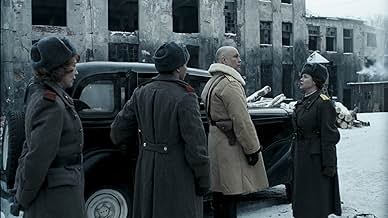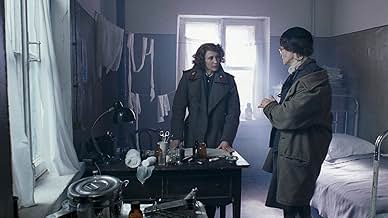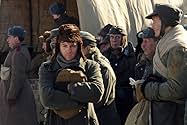AVALIAÇÃO DA IMDb
5,8/10
2,9 mil
SUA AVALIAÇÃO
Adicionar um enredo no seu idiomaIn 1946, a group of German POWs are mistakenly sent to a Soviet female transit prison camp and must cope with the hostility of the Soviet female inmates and guards, under the orders of cruel... Ler tudoIn 1946, a group of German POWs are mistakenly sent to a Soviet female transit prison camp and must cope with the hostility of the Soviet female inmates and guards, under the orders of cruel camp commander Pavlov.In 1946, a group of German POWs are mistakenly sent to a Soviet female transit prison camp and must cope with the hostility of the Soviet female inmates and guards, under the orders of cruel camp commander Pavlov.
- Direção
- Roteiristas
- Artistas
Sergei Baryshev
- Russian Guard 1
- (as Sergey Baryshev)
Aleksandr Bolshakov
- Captain
- (as Alexander Bolshakov)
Natalya Fisson
- Tamara
- (as Natalia Fisson)
Maksim Gudkov
- Schmidt
- (as Maxim Gudkov)
- Direção
- Roteiristas
- Elenco e equipe completos
- Produção, bilheteria e muito mais no IMDbPro
Avaliações em destaque
Yikes! Just watched it in Russian. Fortunately I speak enough Russian to understand the voice-over; wish they had kept it in the original English and just added Russian subtitles. Kretschmann, Bruhl, Farmiga and Press all give excellent performances; Evegeny Mironov does the most amazing "silent" performance since his Russian version of Kafka's "Metamorphosis". I have no doubt that anti-German sentiment was running high in 1946 in Leningrad; nevertheless, surely there was some hope or ray of sunshine in all the gloom. I am beginning to understand why this film was not marketed in America. Unless you lived through those times, or are a student of history, the subject matter of this film may not have much appeal. Still, for you history buffs out there, don't miss some fine acting in this film.
If you have basic knowledge of ww2 and topics that relate to this movie, you won't notice the inaccuracies. But German POWs held by the soviets had a mortality rate of over 90%. The soldiers tied to Leningrad, Stalingrad, Belorussia and any SS would be killed quickly and garunteed.
Also, in the movie they are trying to root out SS. In reality all the SS had a tattoo on them indicating their blood-type and it certified their racial purity. The soviets knew of these tattoos so a quick strip search would quickly weed out the SS.
The Nazis devastated the Slav populations. They killed commissars on sight, killed almost all Russian POWs, destroyed hundreds of German towns, exterminated Russian civilian populations, broke the German-Russian non-aggression pact, sent civilians and prisoners through mine fields and used them as human shields, kidnapped aryan-looking babies for the lebensborne program, Inacted a scorched-earth policy, starved Leningrad into cannibalisn, committed genocide (especially in belorussia and Ukraine and western Russia, allied with Finland, killing off 80% of all Russian 20 year-old males by 1943, and used Slav women/children as human shields while rushing soviets positions... not to mention officially labeling Russians as "untermensch" (sub-human) and treated them with a pest-extermination attitude while refusing to acknowledge the Geneva convention; in some cases burning barns full of people and forcing POWs to lay down side by side while they freeze them to death water in order to make a sturdy ice-road.... whole areas of Russia were decimated beyond repair, hundreds of thousands of families were exterminated, countless Slavs became slaves, whole regions were burned and bulldozed to nothing, their Jews were almost wiped out and multiple generations of Russians suffered life-long ptsd.
Factoring all that it is clear to see that the Russians were unrealistically civil and empathetic towards the Germans in this movie. The women working in this camp would almost surely be widows and childless due to the war.
I don't support the treatment of German POWs and civilians after the war.... but to say I can't understand the ruthlessness of the Bolsheviks towards the Germans, would be a lie. I can't imagine the pain that nation experienced while trying to rebuild, recover and re-identify.
Also, in the movie they are trying to root out SS. In reality all the SS had a tattoo on them indicating their blood-type and it certified their racial purity. The soviets knew of these tattoos so a quick strip search would quickly weed out the SS.
The Nazis devastated the Slav populations. They killed commissars on sight, killed almost all Russian POWs, destroyed hundreds of German towns, exterminated Russian civilian populations, broke the German-Russian non-aggression pact, sent civilians and prisoners through mine fields and used them as human shields, kidnapped aryan-looking babies for the lebensborne program, Inacted a scorched-earth policy, starved Leningrad into cannibalisn, committed genocide (especially in belorussia and Ukraine and western Russia, allied with Finland, killing off 80% of all Russian 20 year-old males by 1943, and used Slav women/children as human shields while rushing soviets positions... not to mention officially labeling Russians as "untermensch" (sub-human) and treated them with a pest-extermination attitude while refusing to acknowledge the Geneva convention; in some cases burning barns full of people and forcing POWs to lay down side by side while they freeze them to death water in order to make a sturdy ice-road.... whole areas of Russia were decimated beyond repair, hundreds of thousands of families were exterminated, countless Slavs became slaves, whole regions were burned and bulldozed to nothing, their Jews were almost wiped out and multiple generations of Russians suffered life-long ptsd.
Factoring all that it is clear to see that the Russians were unrealistically civil and empathetic towards the Germans in this movie. The women working in this camp would almost surely be widows and childless due to the war.
I don't support the treatment of German POWs and civilians after the war.... but to say I can't understand the ruthlessness of the Bolsheviks towards the Germans, would be a lie. I can't imagine the pain that nation experienced while trying to rebuild, recover and re-identify.
A decent film about a group of German POWs are accidentally sent to a female-run Soviet prison camp.
Drama post-WWII film about German soldiers in a concentration camp with superb interpretation and tension enough.
Directed by Tom Roberts from a screenplay by Natalia Nightingale-Grey and Simon van der Borgh, In Tranzit has the following synopsis: Set in Leningrado, 1946, in the chaotic aftermath of WWII, a group of German prisoners are sent to a female transit camp by the cruel Russian Commander Pavlov (John Malkovich). When the guards are given the task of weeding out the SS officers, they play a bitter game of cat and mouse with the prisoners. Natalia (Vera Farmiga) and the inmate Max (Thomas Kretschmann) feel a great attraction for each other while the prisoner Klaus (Daniel Brühl) attempts to convince Max to denounce some prisoners to please and obtain privileges from the Russians. Each group slowly learns that situations are not what they seem; prejudices are sometimes unjustly held; and love can be found in even the harshest places. From her greatest enemy came her greatest love !
From the beginning the film seems to develop like the typical story of concentration camps with the particularity that prisoners are Nazis, the plot then takes an intriguing tack when they must cope with the hostility of the Soviet female inmates and guards, suffering a undisguised resentment from their previous criminal activities. The film turns out to be decent enough, dealing primarily with the relationships between German prisoners and their guards, who are mostly Russian women, adding brief intrigues about who the snitch is. This is a well-paced and well-acted movie. However, it is marred by a terrible ending with a bizarre and twisted plot that is not well developed.
.Alongside the two main characters: Vera Farmiga, Thomas Kretschmann, John Malkovich giving engaging performances, there is a long list of supporting characters - many of them in their early days and who would later go on to develop successful careers, such as: Daniel Brühl, Natalie Press, Patrick Kennedy and John Lynch.
This unknown film was professionally directed by Tom Roberts , but it failed at the boxoffice, and that's why it was distributed straight to DVD in several countries. Tom is a craftsman, writer, producer and director who has filmed both for television and the big screen, including his following works: ¨Hebron Exposed - A Weapon of Life¨, ¨Every Last Child¨, Alfred and Jakobine¨, ¨Mandela: The Prison Years¨, ¨Ghosts of the 7th Cavalry¨, ¨ Frontline¨, ¨Dispatches¨, ¨Wide Angle¨, ¨ Witness¨ , ¨Time watch¨, among others. In tranzit (2008) rating; 6.5/10. The movie will appeal to WWII enthusiasts.
Directed by Tom Roberts from a screenplay by Natalia Nightingale-Grey and Simon van der Borgh, In Tranzit has the following synopsis: Set in Leningrado, 1946, in the chaotic aftermath of WWII, a group of German prisoners are sent to a female transit camp by the cruel Russian Commander Pavlov (John Malkovich). When the guards are given the task of weeding out the SS officers, they play a bitter game of cat and mouse with the prisoners. Natalia (Vera Farmiga) and the inmate Max (Thomas Kretschmann) feel a great attraction for each other while the prisoner Klaus (Daniel Brühl) attempts to convince Max to denounce some prisoners to please and obtain privileges from the Russians. Each group slowly learns that situations are not what they seem; prejudices are sometimes unjustly held; and love can be found in even the harshest places. From her greatest enemy came her greatest love !
From the beginning the film seems to develop like the typical story of concentration camps with the particularity that prisoners are Nazis, the plot then takes an intriguing tack when they must cope with the hostility of the Soviet female inmates and guards, suffering a undisguised resentment from their previous criminal activities. The film turns out to be decent enough, dealing primarily with the relationships between German prisoners and their guards, who are mostly Russian women, adding brief intrigues about who the snitch is. This is a well-paced and well-acted movie. However, it is marred by a terrible ending with a bizarre and twisted plot that is not well developed.
.Alongside the two main characters: Vera Farmiga, Thomas Kretschmann, John Malkovich giving engaging performances, there is a long list of supporting characters - many of them in their early days and who would later go on to develop successful careers, such as: Daniel Brühl, Natalie Press, Patrick Kennedy and John Lynch.
This unknown film was professionally directed by Tom Roberts , but it failed at the boxoffice, and that's why it was distributed straight to DVD in several countries. Tom is a craftsman, writer, producer and director who has filmed both for television and the big screen, including his following works: ¨Hebron Exposed - A Weapon of Life¨, ¨Every Last Child¨, Alfred and Jakobine¨, ¨Mandela: The Prison Years¨, ¨Ghosts of the 7th Cavalry¨, ¨ Frontline¨, ¨Dispatches¨, ¨Wide Angle¨, ¨ Witness¨ , ¨Time watch¨, among others. In tranzit (2008) rating; 6.5/10. The movie will appeal to WWII enthusiasts.
This is supposedly based upon a true story. maybe the part that is true is that the Russians didn't have enough space for all their prisoners, and just dumped four dozen in a lightly staffed women's prison.
Starring Thomas Kretschmann, who managed six roles in 2008 including Wanted and Valkyrie in addition to this one. Also featuring Vera Farmiga (The Departed), who only had four roles in 2008, including The Boy in the Striped Pyjamas. She has a deal with the prison Commandant, played by John Malkovich, to protect her lover from being sent to the front. Also along is Daniel Brühl (Inglourious Basterds, The Bourne Ultimatum, 2 Days in Paris, Joyeux Noël), always a welcome addition.
It was definitely a dark and depressing film, made the more so by the constant snow. There are some SS Officers in the mix and Pavlov (Malkovich) is determined to root them out and hang them. He enlists Natalia (Farmiga) for this task. Malkovich was born for roles like this.
It is strange the the women who hated the prisoners in the beginning for killing their families manage to find forgiveness at the end so they can have sex.
It was the acting, not the script that made this worthwhile.
Starring Thomas Kretschmann, who managed six roles in 2008 including Wanted and Valkyrie in addition to this one. Also featuring Vera Farmiga (The Departed), who only had four roles in 2008, including The Boy in the Striped Pyjamas. She has a deal with the prison Commandant, played by John Malkovich, to protect her lover from being sent to the front. Also along is Daniel Brühl (Inglourious Basterds, The Bourne Ultimatum, 2 Days in Paris, Joyeux Noël), always a welcome addition.
It was definitely a dark and depressing film, made the more so by the constant snow. There are some SS Officers in the mix and Pavlov (Malkovich) is determined to root them out and hang them. He enlists Natalia (Farmiga) for this task. Malkovich was born for roles like this.
It is strange the the women who hated the prisoners in the beginning for killing their families manage to find forgiveness at the end so they can have sex.
It was the acting, not the script that made this worthwhile.
IN TRANZIT is one of those forgotten films the viewer wants to love: an all but unknown bit of history based on a true story that offers a different insight into the universal damage inflicted upon all peoples by WW II. The problem with this production is the embarrassingly weak script by Natalia Portonova and Simon van der Borgh, the unfocused direction by Tom Roberts and the bumpy editing by Paul Carlin. Beautifully photographed by Sergei Astakhov in a manner that emphasizes the brutality of Russian winters, setting a perfect matrix for the drama, this film had potential, but even the isolated acting contributions of a few seasoned actors cannot hide the weak script and the annoying pacing.
1946 and a Russian Women's prisoner of war camp lays unused until it is determined by one evil Russian officer Pavlov (John Malkovich) that it will become a camp for German prisoners of war to ferret out occult members of the Nazi SS group that inflicted such agony on the Russians. The camp is run by a group of angry Russian women soldiers and one Russian physician Natalia (Vera Farmiga) who together with Citizen Zina (Natalie Press) represent the humanistic side of the suffering Russian victims of the German brutality. And so it is German men, including the handsome Max (Thomas Kretschmann) who shares a mutual attraction with Natalia and the enigmatic Klaus (Daniel Brühl) among others, versus the Russian women: role reversal and gender dominance changes create the drama. One key mute figure is Andrei (the brilliant Russian actor Yevgeni Mironov), the psychologically damaged husband of Natalia, who in many ways represents the tragedy of the entire WW II on mankind. How these two groups of people interact and survive the conditions imposed on them forms the story.
Though Farmiga and Kretschmann, Press and Mironov overcome the awkward script in an attempt to suffuse this film with palpable tragedy, the result is a bumpy ride through the obvious pitfalls of amateur film-making. It could have been an important film, but is remains a minor though interesting insight as to the extended effects of war on people's psyches. Grady Harp
1946 and a Russian Women's prisoner of war camp lays unused until it is determined by one evil Russian officer Pavlov (John Malkovich) that it will become a camp for German prisoners of war to ferret out occult members of the Nazi SS group that inflicted such agony on the Russians. The camp is run by a group of angry Russian women soldiers and one Russian physician Natalia (Vera Farmiga) who together with Citizen Zina (Natalie Press) represent the humanistic side of the suffering Russian victims of the German brutality. And so it is German men, including the handsome Max (Thomas Kretschmann) who shares a mutual attraction with Natalia and the enigmatic Klaus (Daniel Brühl) among others, versus the Russian women: role reversal and gender dominance changes create the drama. One key mute figure is Andrei (the brilliant Russian actor Yevgeni Mironov), the psychologically damaged husband of Natalia, who in many ways represents the tragedy of the entire WW II on mankind. How these two groups of people interact and survive the conditions imposed on them forms the story.
Though Farmiga and Kretschmann, Press and Mironov overcome the awkward script in an attempt to suffuse this film with palpable tragedy, the result is a bumpy ride through the obvious pitfalls of amateur film-making. It could have been an important film, but is remains a minor though interesting insight as to the extended effects of war on people's psyches. Grady Harp
Você sabia?
- CuriosidadesThe film was distributed straight to DVD in several countries.
- Erros de gravaçãoWhen Soviet NKVD Colonel Pavlov explains to the German POWs that he's after former SS members hiding among regular German Army soldiers he mentions the war crimes committed by the 8th SS division in the Leningrad area during 1941. Pavlov also mentions the name of Heinrich Lombard, former commanding officer of the 8th SS division (00:27:48). However, the 8th SS division wasn't formed before 1942. During its existence this SS unit never undertook operations in the Leningrad area. Moreover, the 8th SS division, initially named SS Cavalry Brigade and later re-named the 8th SS division "Florian Geyer", never had any commanding officer by the name of Heinrich Lombard. The first commanding officer of the 8th SS division was Gustav Lombard.
Principais escolhas
Faça login para avaliar e ver a lista de recomendações personalizadas
- How long is In Tranzit?Fornecido pela Alexa
Detalhes
- Tempo de duração1 hora 53 minutos
- Cor
- Mixagem de som
- Proporção
- 16 : 9
Contribua para esta página
Sugerir uma alteração ou adicionar conteúdo ausente

Principal brecha
By what name was Vítimas da Guerra (2008) officially released in India in English?
Responda

